Are Perfumes Poisoning Us?
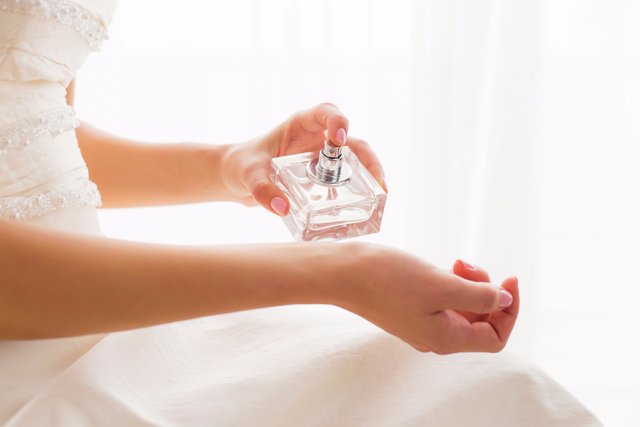
Introduction
Ever since I can remember I have had a very strong reaction to certain perfumes and air-fresheners.
Whenever someone comes near me after using a strongly scented substance I feel very sick and get a headache.
This can often be accompanied by eye irritation, a runny nose and wheezing - being an asthmatic with lots of allergies these are rather worrying signs!
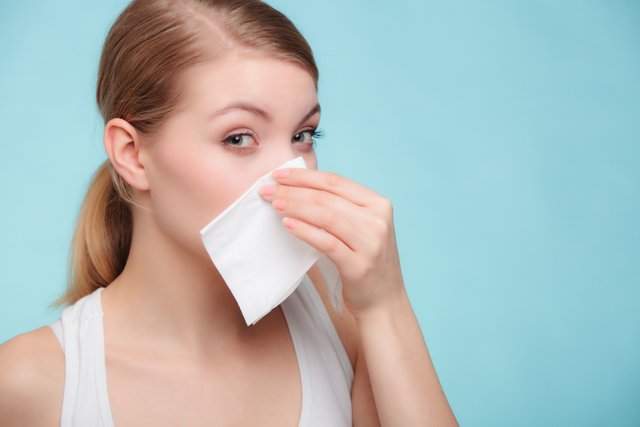
It has caused me to avoid such substances as much as possible.
This is not an easy task, it is hard to buy any toiletry or household product that is not (strongly) artificially scented.
You also pay a hefty price premium to buy more natural/neutral scented products.
Further I am still exposed to them all the time because everyone else uses them.
I always assumed it was some kind of weird reaction that was unique to me because nobody else ever seemed to speak about it.
As I have said before I have quite bad asthma which predisposes me to all sorts of allergies and weird reactions so I assumed I was the only one with this problem.
That was until a few days ago when I heard an interesting interview:
Kate Grenville on Mysterious Universe
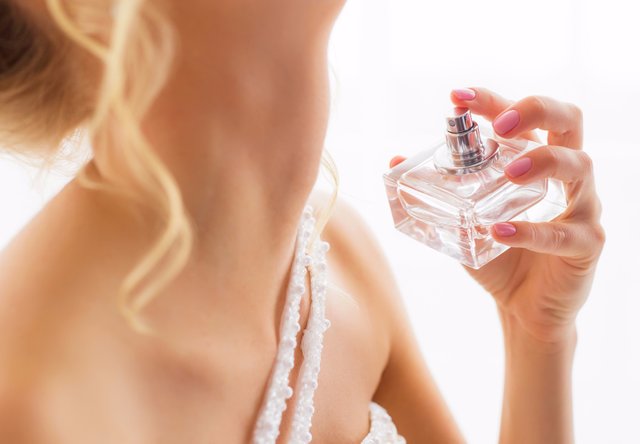
Whilst listening to one of my favourite podcasts (Mysterious Universe) I came across an interview with author Kate Grenville.
You can listen to the episode here.
The interview starts at 4:42 and ends at 31.58 and is really worth listening to.
The Case Against Fragrance
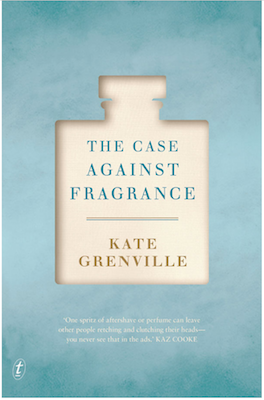
Grenville has recently published a book called "The Case Against Fragrance".
In it Grenville talks about her own responses to fragrances in products that were eerily similar to my own.
The podcast interview makes some very important points and there is also a summary of Grenville's research on her website.
Main Points Grenville Discusses
I will try to summarise the points that she makes in the interview and on her website (as well some of my own additional thoughts on the subject):
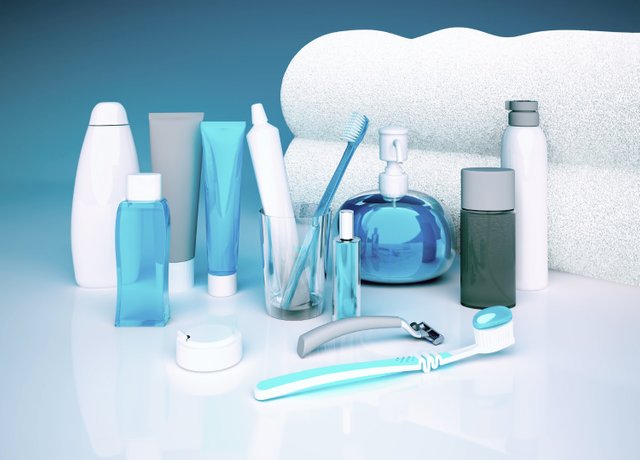
1. Artificial fragrances are in almost every household product
It is not just the obvious things like perfumes, aftershave, air fresheners or soaps.
Think of a powder or spray you use and they are likely scented.
Washing up liquid, dishwasher powder, and fabric softeners contain them.
More surprisingly even things like toilet paper and bin (garbage) bags these days are scented.

2. They are used because they are cheap
In times past scents were created using natural ingredients like flowers and animal products.
These required tonnes of flowers to produce a kilogram of fragrance which is why these things were unaffordable luxuries for most people.
After World War II chemical companies started to use artificial compounds which were thousands of times cheaper.
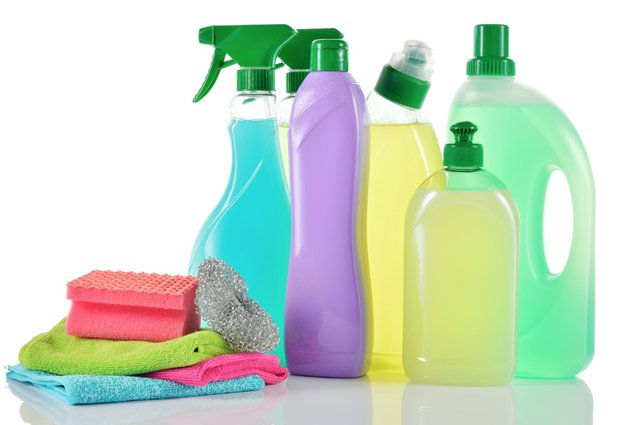
3. The fragrance industry is self-regulated
There is no independent oversight of the chemicals being used as fragrances.
Of particular concern is the industry practice where the actual fragrant compounds are not declared.
These are considered trade secrets and therefore the fragrant component which may consist of several hundred chemical compounds can simply be listed as "Fragrance" or "Parfum".
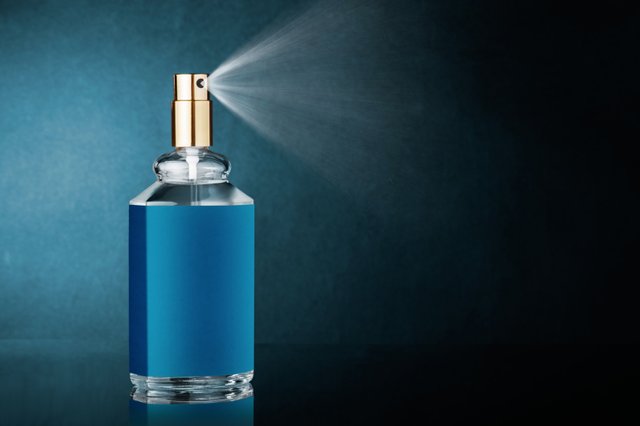
4. Most fragrance compounds are untested in humans or animals
As a result of the lack of oversight most chemicals used in this way are completely untested.
We have no idea what health effects they have in the short or long term, either in animals or in humans.
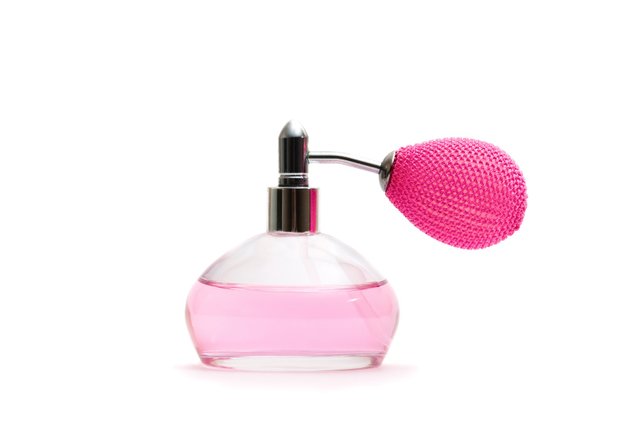
5. Those that have been tested have been linked to a number of health problems:
These include:
- Allergies, asthma, allergic skin reactions
- Potential neurotoxicity - one substance (AETT) was banned in the late 70s after being used for decades and incidentally found to have destroyed myelin (a substance which insulates nerves) in a similar way to multiple sclerosis.
- Carcinogenesis with long term exposure.
- Hormonal disruption (artificial musks), some of these substances mimic oestrogens - causing gender disturbances in wildlife (e.g. fish).

6. They can persist in the environment
Of particular concern is the fact that some of these substances persist in the environment.
They find their way into the water supply and are not eliminated by water or sewage treatment plants.
This seems to particularly be the case with artificial musks which have been found to have gender altering effects on fish and other river based animals (see section on literature below).
This can also cause them to concentrate in human food due to our position in the food chain.
High levels have been found in breast milk and umbilical cord blood.
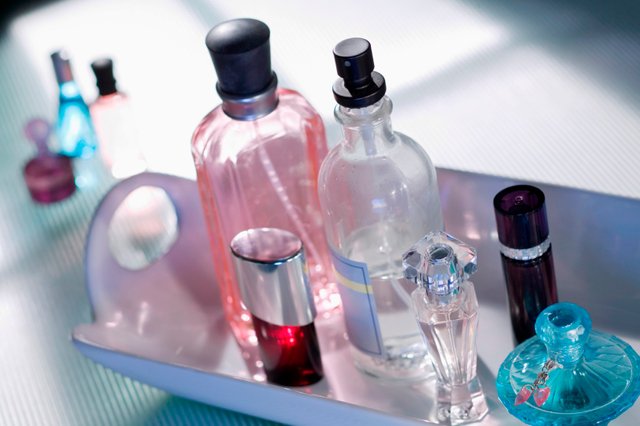
7. Even less is known about the combined effects
According to Grenville the average person is exposed to at least 15 different fragrance products before they even have breakfast.
Each of those may contain several hundred unlisted compounds which may impact on health.
What is even more worrying is the fact that the little evidence and research there is tends to cover the effects of individual compounds.
We have even less idea what the combined effects of all these substances would be:

Batman (1989) Movie Image Source
Joker Gas Analogy
This actually brought to my mind the original 1989 Batman movie.
The Mysterious Universe guys even mention this later in the show!
In that movie, the Joker contaminates all toiletries with a set of substances which when used in a particular combination, create the deadly "Smilex" gas.
As a result the whole of Gotham city is forced to stop using these products until Batman figures out the right combination which people must avoid to be safe.
The potential problems from fragrance products may not be as immediately life threatening but the long term consequences could be just as serious.
In some ways one could say that we are all being used as guinea pigs in a vast experiment.
A Quick Look At the Literature
I wanted to have a quick look at the medical literature to see what definite information we do have to support what Grenville discussed in the interview.
Looking at Pubmed 621 studies come up if one searches for "perfume toxicity", - "fragrance toxicity" reveals 828 studies.
Most of these are in obscure food and toxicology journals and don't even have abstracts.
They are closed access and not available on DeepDyve (a journal subscription site I use) so the ones I was able to actually access were limited (in some cases to just abstracts).
Those which were accessible do confirm what Grenville said in her interview:
AETT
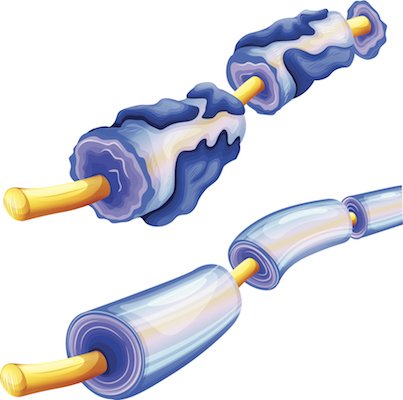
Illustration of Myelin on Nerves from Thinkstock
I mentioned AETT earlier which was withdrawn due to it's effects on myelin.
In the abstract from their 1979 paper Spencer et al [1] state:
"Acetyl ethyl tetramethyl tetralin (AETT), a component of soaps, deodorants, and cosmetics, produces hyperirritability and limb weakness in rats repeatedly exposed to the compound. Brain, spinal cord, and peripheral nerves are discolored blue, show progressive neuronal ceroid degeneration, and develop spectacular myelin bubbling. These neurotoxic properties of AETT provide the basis for industry's decision to withdraw the compound from consumer products."
I also found other studies with similar results including one by Akasaki et al [2]from 1990.
Open Review of Nitro Musks
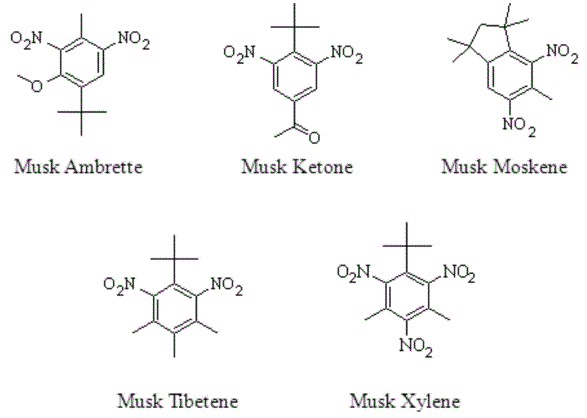
Nitro Musk Structures Taken from Taylor et al Supplementary Materials
There is an open review paper on a subset of musks by Taylor et al [3] which you can download here.
This largely confirms what was said before. These substances are found in many household products.
They persist in the environment and are not eliminated by water/sewage treatment.
They have been found to increase mortality in certain animals as well as mimicking oestrogens (although there is some conflicting data as to the actual effects).
Of even greater relevance is a study they cite by Eisenhardt et al.[4] that showed an association between levels of these compounds and gynaecological and endocrine (hormone) related problems including infertility:
"Significant associations between MX (musk xylene) and MK (musk ketone) concentrations were found in blood and different clinical parameters of the endocrine system. MX and MK may act centrally as a disrupter of the (supra-) hypothalamic-ovarian axis, which may result in a mild ovarian insufficiency. On the basis of our data, a reproductive toxicity and an endocrine effect of NMCs in women cannot be ruled out. Further experimental and clinical studies should be conducted."
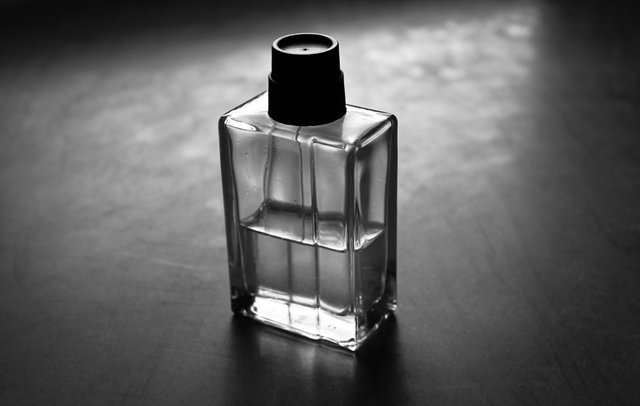
I was only able to access the abstract for this paper but according to Taylor et al these substances are lipophilic (fat soluble) and likely to concentrate in breast milk which may lead to even greater exposure in babies.
These substances also seem to promote tumours/cancers although the exact mechanism is not understood.
One hypothesis is that they interact with other chemicals which directly damage DNA.
They may also have metabolic effects which increase the risk.
Taylor et al. conclude:
"The body of literature supports the conclusion that not only are we being exposed to nitro musks, we are also bioaccumulating them and passing them on to our offspring through breast milk and perinatal exposures.
In light of the evidence, the precautionary principle should be taken into account. This can be done through a reduction in the use and production of products containing nitro musks.
Ingredient Database

Ford et al [4] published a paper in 1999 looking at developing an independent fragrance ingredient safety database.
At the time they stated that over 2000 ingredients were being used by the industry then.
I had a quick look online to see if such a database had been created and didn't find one.
Maybe it is just well hidden or maybe I am bad at finding things.
There is an EU inventory of fragrance ingredients.
This is 1880 pages long and consists of a list of ingredients and their rather vague purposes (pdf here).
There appear to be rather more than 2000 ingredients (although some of them are natural) it would suggest that a lot have been added since 1999.
Notably this inventory does not have any safety or toxicity data.
I did find a paper from Comiskey et al [6] in 2015 which was similarly looking at creating a database.
This one was to collect exposure data and try to do analysis of the combined effects of these types of compounds.
I have not been able to find any more on it and was only able to see the abstract - it might be too soon though.
Hopefully it will have more success.
Conclusion

This is just a brief consideration of the issues raised by the podcast.
I would strongly urge you listen to it if you are interested in the subject.
It is also a great show in general (if you are interested in a mix of the esoteric, paranormal and science).
We are exposed to a vast multitude of artificial fragrance compounds on a daily basis.
Grenville seems to be expressing a legitimate concern as it pertains to the unregulated and untested nature of substances which we are being exposed to on a large scale.
Even if you don't have an immediate extreme response to them (like I do), the literature would suggest that they may still be having long terms effects on you.
These may include increasing the risk of cancer, hormonal abnormalities and even neurological problems.
The most pressing concern is our current ignorance and lack of knowledge on the vast majority of these substances and the potential combinatory effects.
A database of the sort suggested by Comiskey et al would be a good starting point for collating information.
I have ordered Grenville's book and will try to return to the subject once I have read it.
Hopefully by then I will have better journal access so I can look at this in a bit more depth and maybe we will have more research.
Finally please let me know if you have any kind of problems with fragrances yourself.
It would be interesting to hear the experience of others.
References
Spencer, P. S., A. B. Sterman, D. S. Horoupian, and M. M. Foulds. 1979. “Neurotoxic Fragrance Produces Ceroid and Myelin Disease.” Science 204 (4393): 633–35.
Akasaki, Y., S. Takauchi, and K. Miyoshi. 1990. “Cerebellar Degeneration Induced by Acetyl-Ethyl-Tetramethyl-tetralin(AETT).” Acta Neuropathologica 80 (2): 129–37.
Taylor, Kathryn M., Marc Weisskopf, and James Shine. 2014. “Human Exposure to Nitro Musks and the Evaluation of Their Potential Toxicity: An Overview.” Environmental Health: A Global Access Science Source 13 (1): 14.
Eisenhardt, S., B. Runnebaum, K. Bauer, and I. Gerhard. 2001. “Nitromusk Compounds in Women with Gynecological and Endocrine Dysfunction.” Environmental Research 87 (3): 123–30.
Ford, Richard A., Bruce Domeyer, Otho Easterday, Kurt Maier, and John Middleton. 2017. “Criteria for Development of a Database for Safety Evaluation of Fragrance Ingredients - ScienceDirect.” Accessed February 24. http://www.sciencedirect.com/science/article/pii/S0273230099913624?via%3Dihub.
Comiskey, D., A. M. Api, C. Barratt, E. J. Daly, G. Ellis, C. McNamara, C. O’Mahony, et al. 2015. “Novel Database for Exposure to Fragrance Ingredients in Cosmetics and Personal Care Products.” Regulatory Toxicology and Pharmacology: RTP 72 (3): 660–72.
Thank you for reading

Before you go have you filled in the Coinbase form to list STEEM? It only takes a few seconds. THIS POST shows you how.
If you like my work please follow me and check out my blog - @thecryptofiend and follow me on Twitter : Soul_Eater_43
Uncredited Images are taken from my personal Thinkstock Photography account. More information can be provided on request.
Are you new to Steemit and Looking for Answers? - Try:

It's a very sad set of circumstances, but just about everything in this life, from our food to our water, to our toothpaste to our WIFI.. It's all poisoning us. I think the most important question is whether or not it's really just about increasing profit margins, or if it's something a little more sinister.
I think most likely it's a bit of both, like intentionally keeping our bodies weak so that we constantly get sick and require drugs, increasing the pharmaceutical industry's profits.
I'm just a tinfoil head though. So you probably shouldn't listen to anything I say...
In regards to this study, I think Americans have it even worse because there is less regulations on the use of chemicals over there, though I'm not entirely convinced that regulations in the EU are actually enforced with any level of conviction.
This study brings to mind a spoof commercial I seen on a comedy news show some time ago. It's very similar only it's about make up.
Lol!
In reality there is a consequence for every compound we expose our selves to, from water, to monovalent cation variety (salt Na+ or K+ ) to food to cleaners to even perfume compounds. It is good to become cognizant of all of these various risks and make informed decisions as to how to live our lives. That doesn't make the risks from any one thing in the list above all that huge however. It just means that the risks are there.
Nice post, and very well researched.
Thanks. Yes that is the problem with modern society we are exposed to so many different chemicals. It is a balance of risk vs benefit. In the case of perfumed products there isn't really a huge benefit.
I also feel ill when exposed to artificial scents. I avoid the detergents aisle at stores, and only purchase unscented laundry detergent. I also give a wide berth to women who wear perfume. Yesterday there was a fellow librarian who was wearing something powerfully scented, and I had to simply stay away from where she was working as much as possible.
I often have to do the same!
I don't really care if they're toxic or not, I just really really hate smelling them.
It's just an annoying thing I have to put effort into to avoid sniffing.
Like, I just want to clean my dishes, not inhale weirdly scented air that doesn't make any sense to smell. Like, why should my dishwasher even use scented soap pods? I don't want my dishes to smell like anything...
Even my trash bags have fragrance. I'm not naive. I know that rotting trash smells, but to cover it up with something even worse is just bizarre.
Down with fragrance!
Exactly!
Wow, man I'm shocked! What amazing writing skills you have! I think you just use few of those perfumes on me and I fell so good but in the same time dizzy. I smell perfume thru the pictures and I know it will harm me. So, yes I will stick with natural ones! :D You are an amazing writer!
That is very kind of you to say. I am trying to use natural and unscented products too!
Short answer, "Yep."
I have asthma so I hate it when people wear heavy perfumes or have air "fresheners" in their homes. Luckily for me, my girlfriend has sensitive skin and can't wear perfumes.
Yes I think a lot of people are so desensitised that they don't even realise.
So many perfumes and fragrances are poison. I can't even cope with the fact people can't realize the danger they pose. I haven't read your post yet but I will. I'm glad you're bring an in depth investigation on it. Thank you.
You're welcome. It is another hidden danger in the modern world.
Learn about essential oils and truly natural scents. I highly doubt it's the scents themselves but the toxic artificial chemicals you're reacting to. Many synthetic cosmetics use heavy metals in their ingredient lists and other toxic chemicals. If you wouldn't eat it why are you inhaling it? And remember your skin is absorbs chemicals too, that's how a poltice or medicial salve work, by being absorbed through your skin. If you can absorb medicine in through your skin you can also absorb in toxins.
You can make some very nice scents with some simple essential oils, natural carrier oils and some vinegar or alchohol. Or if you prefer lotions or salves get some beeswax which can both thicken (if you add it to straight up oils and buttters) or act as an emulsifier and allow you to bind oil and water (thus making thinner recipies for lotions). Just learn your herbs.
Avoiding them on other people isn't always possible.
No it's not, People like their beauty products even if it's simple deoderant and soap. I think it's a question of education because not only is it healthier to make your own stuff but it's actually cheaper long term. You can make MANY different things using essential oils and the base oils, not just beauty products but also medicines as well. Once I perfect my skills with lotions and salves I'm going to move on to making soap. Though I might need a bit more equipment for that.
Let me know how you get on. Maybe you can post on it?
Might just start doing that. :-)
Cool:)
Hmmm.. I knew there was a reason I stopped wearing perfume... just seemed wrong. Now I only use essential oils.
Yes me too. I might try the oils because I just use unscented things mainly now.
I'm lucky to have two friends who work in the natural perfumery niche, their fragrances are so much better than the mass-market shit!
Yes but they are generally a lot more expensive and weaker in strength - I suspect it is hard for them to compete against the cut price artificial scents.
Some of them are strong and long-lasting, but I totally agree about the price.